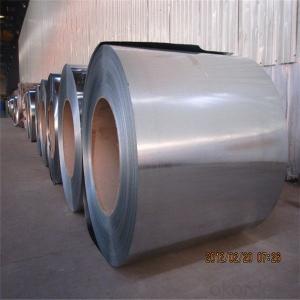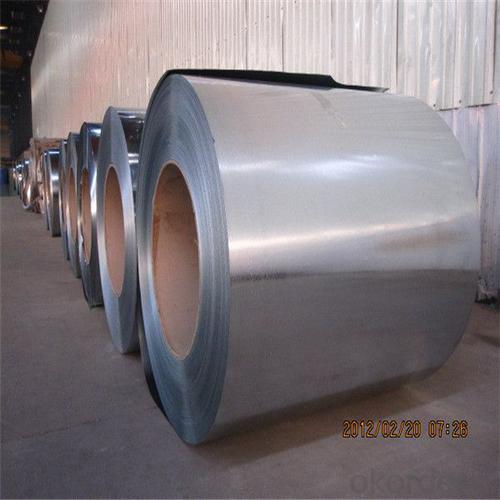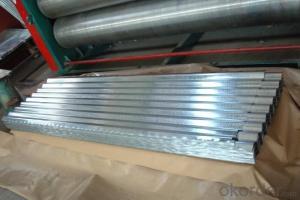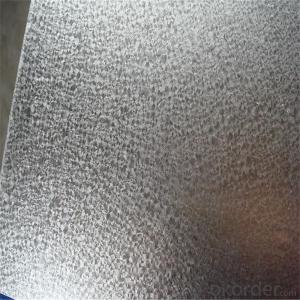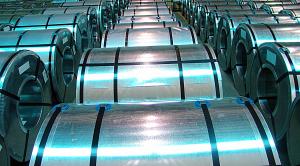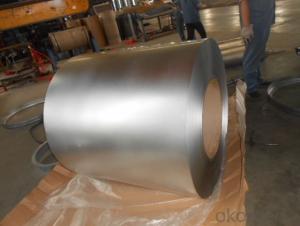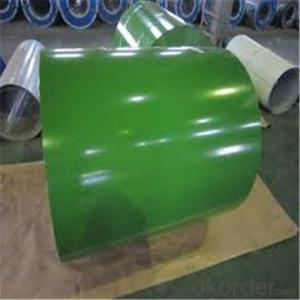Aluzinc Coated Galvanized Steel Sheet in coils
- Loading Port:
- Tianjin
- Payment Terms:
- TT OR LC
- Min Order Qty:
- 25 m.t.
- Supply Capability:
- 14567 m.t./month
OKorder Service Pledge
OKorder Financial Service
You Might Also Like
Specification
Galvalume steel sheet is a carbon steel sheet laminated with an aluminum-zinc alloy. Also known as
Zincalume, this product is protective against corrosion in many conditions, which makes it ideal for
roofing, siding, building components and architectural panels.
Standard and Grade :
Hot-dip Aluzinc steel coils | ||||
ASTM A792M-06a | EN10327-2004 | JIS G 3321:2010 | AS- 1397-2001 | |
Commercial quality | CS | DX51D+AZ | SGLCC | G1+AZ |
Structure steel | SS GRADE 230 | S220GD+AZ | SGLC400 | G250+AZ |
SS GRADE 255 | S250GD+AZ | SGLC440 | G300+AZ | |
SS GRADE 275 | S280GD+AZ | SGLC490 | G450+AZ | |
SS GRADE 340 | S320GD+AZ | SGLC570 | G450+AZ | |
SS GRADE 550 | S350GD+AZ | G500+AZ | ||
S550GD+AZ | G550+AZ | |||
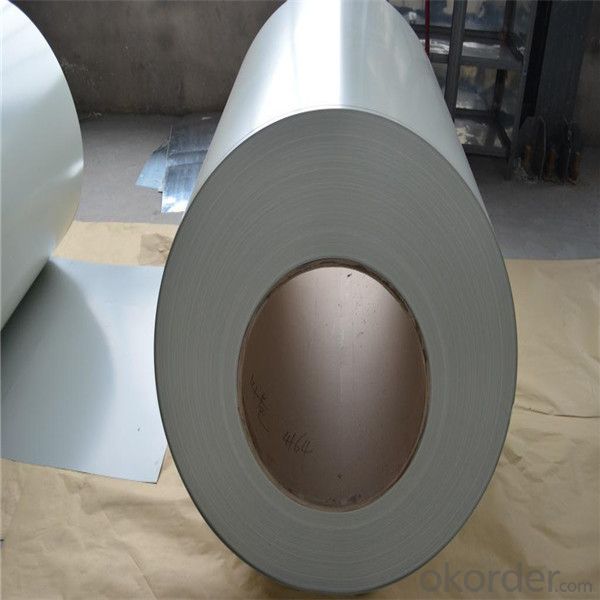
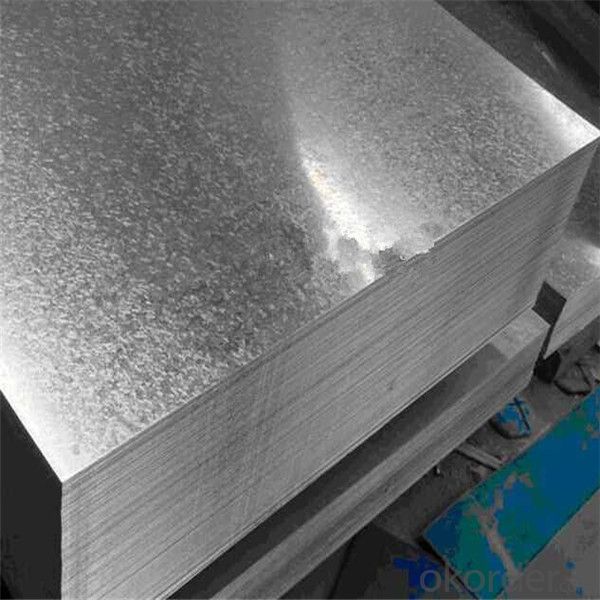
Application :
Production of cold formed corrugated sheet and profiles for roofing, cladding, decking, tiles, sandwich
walls, rainwater protective systems, air conditioning duct as well as electrical appliances and engineering.
Packaging & Shipping
Packaging Detail | The packing of coil consists of anti-damp paper ,PVC film ,hardboard paper , steel box , strapped with steel strips, fitted with locks and edge protectors and guarantees the optimal condition of the delivered goods. Each coil can be additionally fitted with wooden/steel skids(eye of the side) or wooden pallets(eye of the sky) |
Delivery Time | within 30 days of receipt of LC original or prepayment |
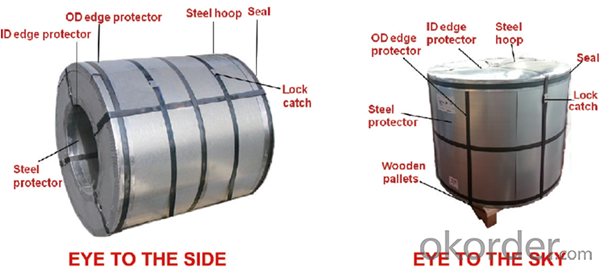
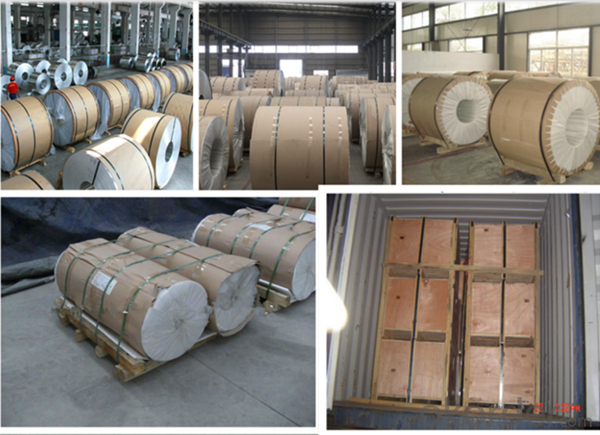
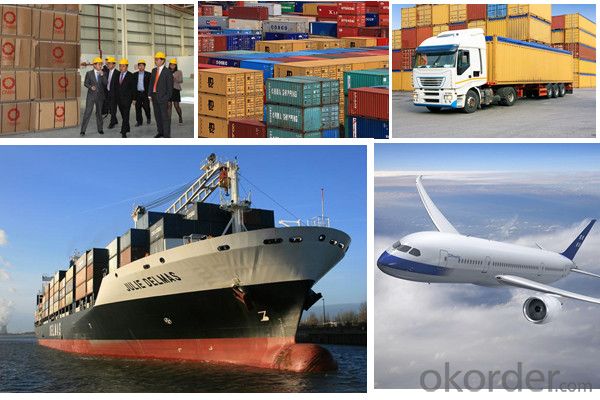
Our Services
MOQ | FCL, 25 metric tons per 20GP, can be assorted with different sizes. |
LCL for trial order is acceptable. | |
Price Term | EX-WORK, FOB China Port, CNF, CIF |
Payment | T/T, 30% advanced payment before production and balance before shipment; OR Irrevocable L/C at sight. |
Delivery Time | within 30 days of receipt of LC original or prepayment |
FAQ
Q: How do you guarantee the quality of your product?
A: Every process will be checked by responsible QC which insures every product's quality.
Q: How much is your delivery time?
A: Normally within 30 days of receipt of LC original or prepayment, but mostly according to the
specific requirements or the quantity
Q: I need sample, could you support?
A: We can supply you with the sample for free, but the delivery charges will be covered by our customers.
For avoiding the misunderstanding, it is appreciated if you can provide the International Express Account for
Freight Collect. Also you can have a visit to us, welcome to CNBM!
- Q: I was looking at my Great-Grandfather's immigration form from when he immigrated from Scotland and he listed his occupation as a steel dresser. What does a steel dresser do?
- I'm not sure, but it could be like and engineer working in steel design or steel polisher. I checked Wikipedia and Yahoo but found nothing. It may be a description of something only in Scotland. Sorry
- Q: What are the different types of steel coil coatings for corrosion resistance?
- There are several types of steel coil coatings available for corrosion resistance, including galvanized coatings, galvannealed coatings, and organic coatings.
- Q: I recently got in a car accident with a steel mailbox, on a snowy day. I was wondering if i can do anything since the steel mailbox caused my car to be totaled. Otherwise it would have been fine and would have suffered only minor damage. Anything I can do here to maybe get some money back? Thanks!
- This will be a collision claim for you, if you have collision you can file a claim and you'll have to pay a deductible, whatever it is. The owner of the mailbox can also file a claim on your insurance since you damaged his/her mailbox. If you don't have collision coverage you won't get squat - this accident is 100% your fault. The steel mailbox didn't cause your car to get totaled, your driving did.
- Q: What are the different types of packaging for steel coils?
- Steel coils can be packaged in various ways to meet the specific needs and preferences of manufacturers and distributors. Here are some commonly used packaging options: 1. Wooden Crates: To ensure safe transportation and handling, steel coils can be packed in robust wooden crates. These crates, made of durable wood materials like plywood or solid wood, provide excellent protection by securely holding the coils in place. 2. Steel Frames: Another option is to use steel frames, constructed with sturdy steel materials, to firmly secure the coils and prevent any movement or shifting. Steel frames are especially suitable for larger or heavier coils as they offer enhanced stability and durability. 3. Cardboard Boxes: For smaller or lighter steel coils, cardboard boxes can be a suitable choice. These boxes, made of strong and durable cardboard, provide adequate protection against minor impacts and scratches. They are also easy to handle and can be conveniently stacked or stored. 4. Plastic Wrapping: In addition to crates, frames, or boxes, steel coils can be wrapped in plastic materials for added protection. Plastic wrapping safeguards the coils from moisture, dust, and external elements during transportation and storage. This packaging option is commonly used in combination with other methods. 5. Transportation Racks: Specially designed transportation racks made of steel or other robust materials can be used for efficient handling and transport of steel coils. These racks securely hold the coils, allowing for easy loading and unloading, and ensuring enhanced safety during transit. Overall, the choice of packaging for steel coils depends on factors such as size, weight, transportation method, and desired level of protection. Manufacturers and distributors carefully consider these factors to select the most appropriate packaging solution that ensures the safe and efficient handling of steel coils throughout the supply chain.
- Q: I don't know why but I'm having a VERY difficult time finding the melting point of 1008 steel.
- It is still the same for 1008 steel. Go to the bottom and see the listing of the grades it covers. Since the only difference between the 1006 and 1008 steel is a few micro amounts of alloys and by far the greatest majority or main component is iron (99%), as a general melt temperature , 2750 F is the melt temperature at which the other alloys are added to the charge to fine tune the mix. Just like adding salt to distilled water actually lowers the boiling point of water, adding alloys to iron decreases the melting point of iron. The iron melts at 2800F, but once alloys to make the 1008 grade are added, it decreases melt temp to 2750F. Since the melting point of pure iron is 2800F, the temperature is actually decreased by adding these impurities of alloys. These alloys are tested while the mix is starting to come down from a pure melt, steel is sampled. and then alloys below are checked and added to make the 1008 steel. The steel is maintained at 2750 F so that the less volatile alloys don't boil off before combining with steel. Minimum Properties Ultimate Tensile Strength, psi 43,900 - 51,900 Yield Strength, psi 26,100 - 34,800 Elongation 42 - 48% Chemistry Iron (Fe) 99% Carbon (C) 0.08% Manganese (Mn) 0.6% max Phosphorus (P) 0.035% max Copper (Cu) 0.2% min Sulfur (S) 0.04%
- Q: What are the main factors that affect the quality of steel coils?
- The main factors that affect the quality of steel coils include the composition and purity of the steel used, the manufacturing process and techniques employed, the temperature and time of the heat treatment, the level of mechanical stress and strain during rolling and cooling, and the presence of any impurities or defects in the final product.
- Q: Not sure if stainless steel is actually sealable but what's the best way to clean a brushed stainless steel appliance to not get so many finger prints...etc. I have stainless steel wipes that I used on another appliance and they don't work so great.
- Make a paste from Lemon Juice and salt, scrub gently, and then rinse with water. To clean a stainless steel surface, use mild detergent,or baking soda or vinegar diluted in water. Clean, then dry with a soft cloth. Most stainless steel has a grain; if you are using any kind of an abrasive on a stainless surface, always make sure you clean in the direction of the grain. The don'ts are: Don't use bleach. Don't use steel wool unless it is an absolute last resort. Some of the fine particles can lodge in the surface of the stainless and will eventually rust, giving the appearance that the stainless itself is rusting. Don't let the following food items (ketchup, mustard, mayonnaise, lemon juice, vinegar, salt, salad dressings) remain on your stainless surfaces for any length of time. If they sit on the stainless for more than a few minutes, they may bleach it out. You can actually rub out this white area with a very fine Scotchbrite pad. Make sure you are going along the grain lines and not at right angles to them.
- Q: I'm getting my nose pierced, meaning that i have to keep the piercing in for a prolonged time. i've always had reactions when wearing sterling silver or fake earrings (i dont know what types of metal they were) after wearing it overnight. Will I get a reaction on my nose piercing if the stud is surgical steel?
- Surgical Piercing
- Q: What are the dimensions of steel coils used in the metal container industry?
- The dimensions of steel coils used in the metal container industry can vary depending on the specific requirements of the industry and the type of container being produced. However, typical dimensions for steel coils used in this industry range from 0.3mm to 3mm in thickness and 600mm to 2000mm in width. The coils are typically wound in a continuous spiral shape, with diameters ranging from 600mm to 1500mm. These dimensions allow for efficient production and handling of the steel coils during the manufacturing process of metal containers.
- Q: How are steel coils used in the manufacturing of airbags?
- Steel coils are used in the manufacturing of airbags to provide stability and structure. These coils are typically placed inside the airbag module to ensure proper deployment and inflation during a collision. The steel coils help maintain the desired shape and prevent the airbag from collapsing, allowing it to effectively protect the occupants of a vehicle in the event of a crash.
Send your message to us
Aluzinc Coated Galvanized Steel Sheet in coils
- Loading Port:
- Tianjin
- Payment Terms:
- TT OR LC
- Min Order Qty:
- 25 m.t.
- Supply Capability:
- 14567 m.t./month
OKorder Service Pledge
OKorder Financial Service
Similar products
Hot products
Hot Searches
Related keywords
